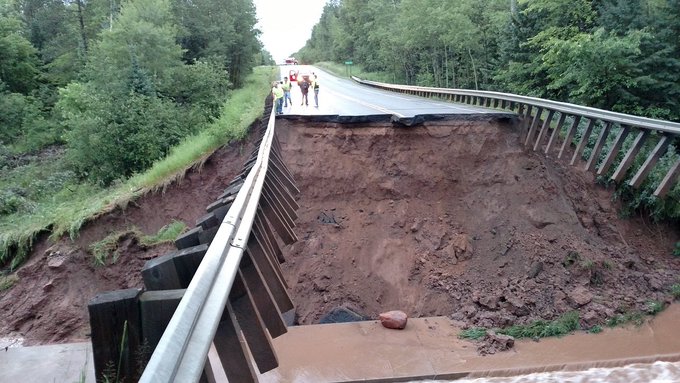Wisconsin has been hit again by flooding that scoured away cars, pavement, and land.
We've also got Scott Walker's 'chamber of commerce mentality' management that scrubbed away important information about why the flooding is likely to get worse.
The rains in SE Wisconsin did stop Friday and the flooding from Dane County to Ixonia to Watertown to I-43 in Milwaukee County is receding.
But you wonder: is there a bigger picture to this?, since parts of Wisconsin - - Watertown, 2016, Racine County, 2017, Racine County, 2008, Madison, 2018, historic flooding in NW Wisconsin in 2018 and 2016

etc. - - have been hit by rains routinely labeled heavy, historic, worst ever., and so on.
And, yes, it's summer and we get storms, but you're also reading about record-breaking heat and climate change, so you ask, what can the Wisconsin experts tell us?
A lot, as they said a lot about it all on the Wisconsin DNR's Great Lakes and Climate Change page, so there you have it:
That science about "Human activities that increase heat–trapping ("green house") gases, " and "Earth´s average temperature has increased 1.4 °F since 1850 and the eight warmest years on record have occurred since 1998," is gone.
And the wording about "more frequent and severe storms" is gone, too - - as I disclosed in December, 2016 and have continuously updated.
In fact, they even took the phrase "climate change' out of the page's title, so this is how its few sentences are labeled now:
So while the page has been rendered useless and striped of its context by heavy-handed, Team Walker ideological editing, and even some valuable links have been deleted, too - - here's what it looks like today - - the warming and the flooding continues.
You can see why Illinois downstream from the massive Foxconn excavation in Racine County has concerns about flooding - - and rightly so - - since Wisconsin keeps sending are incautious and dismissive signals - - from easy wetland filling on the Foxconn site to the dismissal of data and guidance which might help keep Wisconsin's rivers in their banks.
Full Foxconn archive, here.
We've also got Scott Walker's 'chamber of commerce mentality' management that scrubbed away important information about why the flooding is likely to get worse.
The rains in SE Wisconsin did stop Friday and the flooding from Dane County to Ixonia to Watertown to I-43 in Milwaukee County is receding.
But you wonder: is there a bigger picture to this?, since parts of Wisconsin - - Watertown, 2016, Racine County, 2017, Racine County, 2008, Madison, 2018, historic flooding in NW Wisconsin in 2018 and 2016

etc. - - have been hit by rains routinely labeled heavy, historic, worst ever., and so on.
And, yes, it's summer and we get storms, but you're also reading about record-breaking heat and climate change, so you ask, what can the Wisconsin experts tell us?
A lot, as they said a lot about it all on the Wisconsin DNR's Great Lakes and Climate Change page, so there you have it:
Climate Change and Wisconsin´s Great Lakes
Earth's climate is changing. Human activities that increase heat–trapping ("green house") gases are the main cause. Earth´s average temperature has increased 1.4 °F since 1850 and the eight warmest years on record have occurred since 1998.
Increasing temperatures have led to changes in rainfall patterns and snow and ice cover. These changes could have severe effects on the Great Lakes and the plants, wildlife and people who depend on them.
While no one can predict exactly what climate change will mean for our Great Lakes, scientists agree that the following changes are likely if climate change patterns continue.
But did you notice I wrote "they said" - - as in past tense - - because the DNR hasn't said that since 2016.
- Increased summer and winter temperatures will cause increased evaporation, lower lake water levels and warmer water, resulting in reduced habitat for cold water species and a loss of critical wetland areas.
- Decreased winter ice cover will also contribute to increased evaporation and lower lake water levels which could have severe economic consequences for our valuable shipping industry, lakeshore recreation, and coastal businesses.
The good news is that we can all work to slow climate change and lessen its effects.
- Changes in rain and snowfall patterns (including more frequent and severe storms) could change water flow in streams and rivers and increase stream bank erosion and runoff pollution.
That science about "Human activities that increase heat–trapping ("green house") gases, " and "Earth´s average temperature has increased 1.4 °F since 1850 and the eight warmest years on record have occurred since 1998," is gone.
And the wording about "more frequent and severe storms" is gone, too - - as I disclosed in December, 2016 and have continuously updated.
In fact, they even took the phrase "climate change' out of the page's title, so this is how its few sentences are labeled now:
The Great Lakes and a changing worldAnd isn't the world always changing? Clever, no?
So while the page has been rendered useless and striped of its context by heavy-handed, Team Walker ideological editing, and even some valuable links have been deleted, too - - here's what it looks like today - - the warming and the flooding continues.
You can see why Illinois downstream from the massive Foxconn excavation in Racine County has concerns about flooding - - and rightly so - - since Wisconsin keeps sending are incautious and dismissive signals - - from easy wetland filling on the Foxconn site to the dismissal of data and guidance which might help keep Wisconsin's rivers in their banks.
Full Foxconn archive, here.